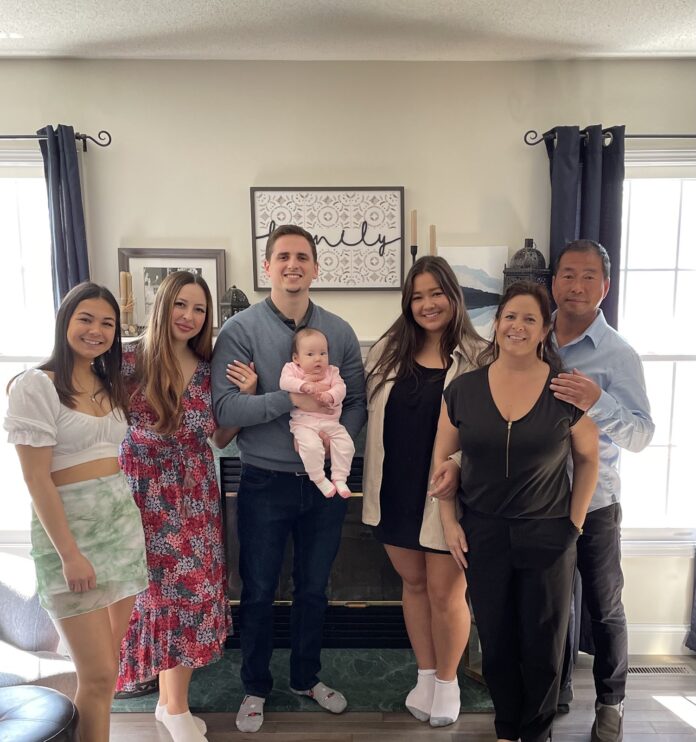By: Sydney Fitzsimmons
Everyone has heard a coming-to-America story, whether it was a movie, a TVshow, ancestors, or history class, but this one is a little different. My father came to America when he was five years old… alone.
He is now known as Luke Fitzsimmons, workaholic, husband, father of three girls, grandpa to one, and uncle to many. Although that story happened over 40 years ago, it is still fresh in his mind, easy to recall and look back on, and has shaped his entire life.
When my father was five years old he was put on a train alone by his father with a small amount of money and no destination. He wandered around the suburbs of Korea trying candy for the first time, specifically red licorice. He remembered it as “one of the greatest feelings ever” but he soon fell asleep on someone’s porch after the long journey. She found this small boy and called an orphanage who realized he was severely hurt. He spent around six months in the hospital and had three surgeries on his left arm, getting a steel plate and a pin inserted and then removed. While he was in the hospital in Korea he got adopted by a family in Lockport, NY. He did not have a choice or say in whether he wanted to go to America, however, he was more hopeful and excited for a new life than scared about the future. He flew from Korea to America and arrived at an orphanage where he clearly remembers changing the baby’s diapers, and helping the nuns take care of other children.
It wasn’t until he got to his new home when he realized what he had been missing out on. A real bed instead of a dirt floor, food that he was allowed to eat, toilets that flushed, and running water for showers, technology like radios and TV, landlines, books, and toys, “my house was so much bigger than anything I had ever seen and I constantly got lost”, a house we would call average or small. He recalls how once he came to America he was terrified of Asian people, he hated them, he hated the language, “If I saw an Asian woman in the grocery store I would immediately sit down, curl into a ball, and sob for the fear that she was going to come over and beat me.” He was traumatized by what he had endured in Korea; he grew up on the countryside with nothing but chasing dragonflies to keep him occupied. He arrived in America in August and started kindergarten in September, learning English from his parents, siblings, and teachers trying to get by. However, in a predominantly white school, he regularly got made fun of, called racial slurs, and bullied because he was Korean. He faced many hardships when he came to America, learning a new language and starting a whole new life as a very young child is extremely difficult, but he was always grateful because he had such a difficult life in Korea.
As he grew up he became a rebel, doing the kinds of things that rebels do, like disobeying the rules and having a very bad temper. He would still regularly get made fun of for his race but he did not just take it anymore, he would fight back and defend himself. One day his ex-marine father said to him, “If you do not do something with your life you are going to end up dead or in jail.” He decided to join the marine-corp to ground him, give him structure, and get his temper under control.
Shortly after the marine-corps he met my mother, and a few years later they got married and had my oldest sister Morgan (she is eight years older than me and the turning point in my dad’s life). Once she was born he always assumed the parental roles, constantly taking care of her and giving my mom a break, going to work for hours on end making any and as much money as he could just to come home and play with his kids all night. He was determined and dedicated to being the best father he could be because he never wanted any of us to feel the way he once had. I asked him if the marine-corps helped, and although they did contribute, he said Morgan is what turned his life around and made him the father he is today. His trauma heavily affected his views on how he wanted to parent and care for his family. I went ahead and asked him if he thought he would ever beat his children and he said, “Of course not, however people planted a lot of doubt in my head, they told me it is hereditary and if my father did it then I will too,” but they were wrong. He wanted to give me and my sisters every opportunity he could because he got none as a kid; he had no structure and no one to turn to for advice for most of his life, and he did not want that for us. My father hoped to shield us from the harsh reality of being an Asian in America–he did not want us to endure the racism that he felt all of his life, he wanted us to be proud to be Asian, and embrace it.
Most people will look at him and see a put-together business and family man who is pretty funny, and very normal. However, he has a past that goes beyond what many of us have ever known or felt. He overcame his trauma and past to become the funny business and family man he is today, you can overcome trauma, you can beat it, and become the person you want to be.










